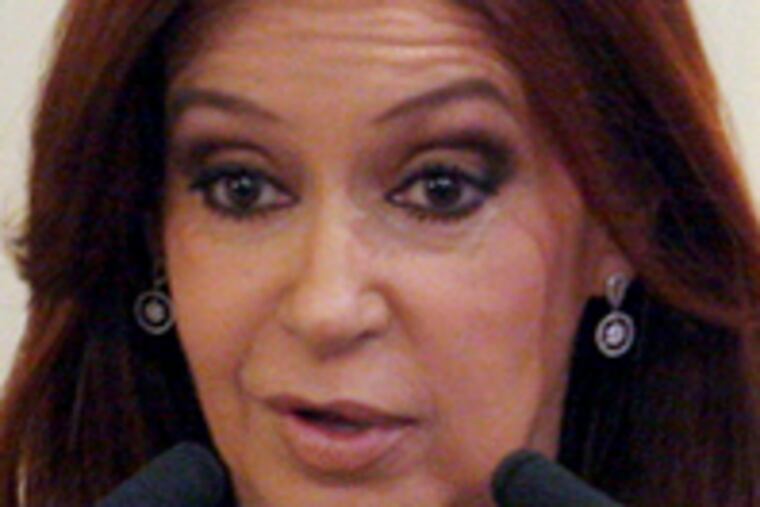Argentine leader berates U.S. over suitcase of cash
U.S. officials alleged the money was an illegal campaign gift from Hugo Chavez.

LIMA, Peru - Argentina's new president berated the United States yesterday for alleging that the government of Venezuelan President Hugo Chavez had tried to illegally funnel cash to her recent presidential campaign, labeling the accusations "garbage."
U.S. officials said four men who were charged in Miami in connection with the case - and who allegedly conspired to cover up the truth - had close ties to the Venezuelan administration.
U.S. prosecutors said Wednesday that they had evidence that a suitcase containing nearly $800,000 seized by Argentine customs officials in August came from the Chavez administration and was destined for the campaign of Cristina Fernandez, who was sworn in Monday as Argentina's president.
Fernandez, elected by a wide margin in October, contended yesterday that the United States had manufactured the scandal to punish her for friendly relations with Chavez.
Venezuela's influence in Latin America has long troubled U.S. officials, who have accused Chavez of using oil profits to finance allies throughout the region.
A senior U.S. official knowledgeable about the investigation said the case shed light on how Chavez's government has relied on businesspeople close to it to channel money without being detected.
Guido Alejandro Antonini Wilson, an affluent businessman in the oil industry and in arms sales, was detained Aug. 4 after landing at a Buenos Aires airport with the money-packed suitcase. Antonini, who cooperated in the investigation, holds U.S. and Venezuelan passports and lives in the Miami area.
"The modus operandi is the Venezuelan government reaches out to individuals like Antonini Wilson, allowing him to make a lot of money with contracts," said the official, who spoke on condition of anonymity because of the delicate nature of the subject. "And the cost is, when they want him to move money, he moves it, and he moves it to whomever they ask him to deliver it to."
Less than two weeks after the money was seized, a group of Venezuelans traveled to Miami to pressure Antonini to conceal the truth about the cash, according to the criminal complaint filed in Miami. The men told Antonini that Argentine and Venezuelan authorities would pursue him if he denied that the funds were his, and that his children could be harmed.
Among those who prosecutors say pressured Antonini were Carlos Kauffmann and Franklin Duran. Duran owns an arms importer that has provided weapons for police agencies in Venezuela. Duran and Kauffmann are also executives in a petrochemical and oil-services company with close ties to the Venezuelan state oil behemoth, Petroleos de Venezuela.
An attorney for the men told the Associated Press that his clients were innocent.
According to U.S. officials, the Venezuelans told Antonini that Fernandez could lose the election if the truth came out. And they tried to soothe him by explaining that Petroleos de Venezuela would pay for any expenses he might incur for the seizure of the cash.
U.S. officials said it had been a priority for Venezuela's government to ensure that the source of cash sent to other countries never be discovered.
More than perhaps any other country in the region, Argentina has tried to balance friendly ties with both the United States and Venezuela, which has helped it recover from its 2001 financial crisis by buying billions of dollars worth of Argentine bonds.
In her campaign, Fernandez stressed the importance of strengthening Argentina's foreign relations, including those with the United States.
Yesterday, discussing the burgeoning controversy, she sided squarely with Venezuela. "I'm going to continue to strengthen relations with all friendly Latin American nations, including" Venezuela, she said at the presidential palace in Buenos Aires.
In a thinly veiled reference to the United States, Fernandez also complained that some countries wanted others "subordinated" to them.
The State Department declined to address the specifics of the allegations yesterday, but spokesman Sean McCormack said the Venezuelan government had "tried to insert themselves into various elections throughout the region, and in several cases it has backfired."